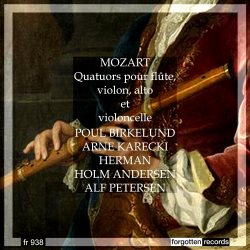|

|
Wolfgang Amadeus MOZART (1756-1791)
Flute Quartet in D major, K285 [14:21]
Flute Quartet in G major, K285a [10:39]
Flute Quartet in C major, K285b [14:06]
Flute Quartet in A major, K298 [9:56]
Poul Birkelund (flute)
Arne Karecki (violin)
Herman Holm Andersen (viola)
Alf Petersen (cello)
rec. 1956, Festival Hall of the Technical High School, Copenhagen
FORGOTTEN RECORDS FR 938 [48:57]
One of my most memorable Christmas presents as a child was an LP my parents bought me. It was of Mozart’s Four Flute Quartets played by the Philharmonic Soloists Berlin on the DG label. It had been recorded in the Jesus-Christus-Kirche, Berlin Dahlem in May 1965 and, to my knowledge, has never been issued on CD. It sparked an interest in these chamber works which has never left me. Over the years, I have collected a few other recordings of these delightful works on the way. In fact, as far as I can remember, this LP was my introduction to the music of Mozart.
It’s astonishing considering Mozart’s indifference and dislike of the flute, as documented in his writings, that he wrote so much for it. He rose to the occasion and summoned up the inspiration to produce two concertos and four quartets; not to mention the concerto for flute and harp. Each is deeply inspired and the listener never feels, in any way, short-changed.
It was whilst the composer was in Mannheim, on tour with his mother, that he received a commission from a Dutch amateur flautist, a wealthy medical man working for the East India Company. Ferdinand Dejean wanted ‘three small, light and short concertos and a couple of quartets for the flute’. He offered Mozart two hundred gold pieces but, in the end, the composer just received 96 for only partially fulfilling the request. He started work immediately on the D major Quartet K285, and this is the only composition which can be positively identified as resulting from the commission.
The quartets display a wealth of ingenuity and invention and are fashioned in a conversational style. As entertainment pieces, they fit into the category of ‘divertimento’. The flautist is given the opportunity to display his or her technical virtuosity, and exploit the tonal possibilities of the instrument to the full. The players here give engaging readings but with some minor reservations. I thought that the opening allegro of K285 a little cautious and underpowered with a broader tempo compared with some. Whilst there is a certain grace and charm, the music doesn’t really smile. One only needs to compare this opening movement with that of the Amadeus Quartet and Andreas Blau on DG. Here the atmosphere is more relaxed with the sun coming out; on the recording under review, the day stays somewhat overcast. Yet, despite the problems of K285, the other quartets display a limpid charm and are delivered with warmth and intimacy. The flute is rather forwardly placed, which tends to render the string detail lacking on occasion.
The recording dates from 1956. The four players whose names, I must confess, are new to me, deliver serviceable performances, but for that extra spark I would look elsewhere to maybe the Amadeus Quartet or Grumiaux and co. Digital re-mastering from clean copies of Vanquard and Metronome LPs is excellent, as is the norm with this label. As for the Philharmonic Soloists Berlin recording on the DG LP I mentioned at the beginning, I would issue a plea to Forgotten Records to earmark it for possible future release.
Stephen Greenbank
 |
 |
|











